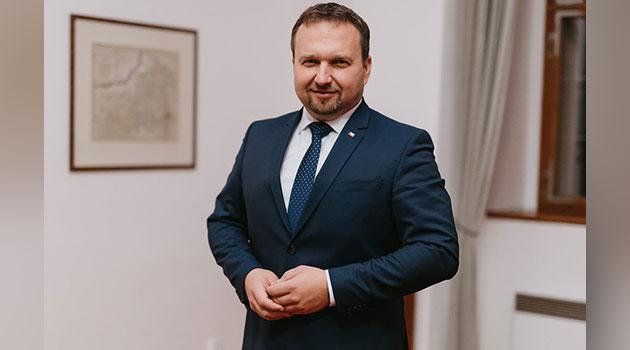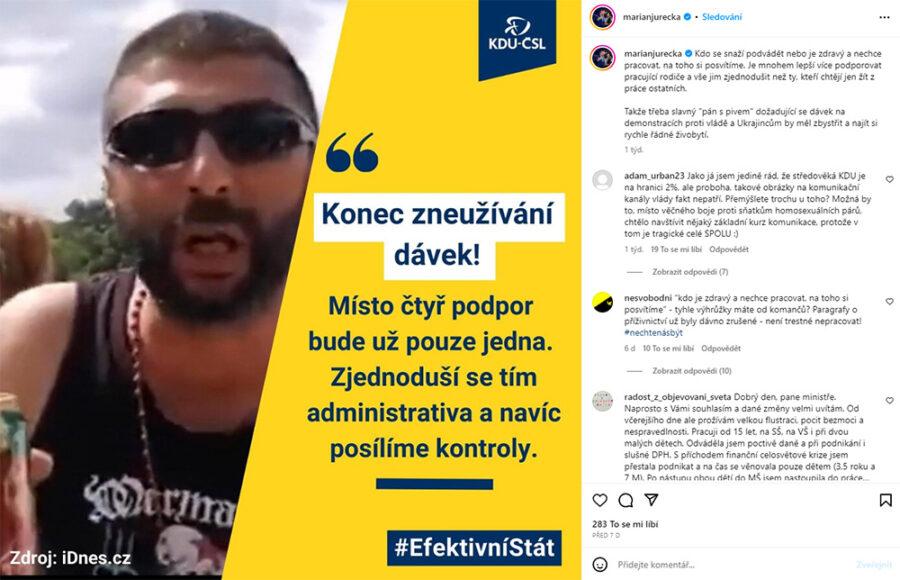Czech Labor Minister uses stereotypical image of Romani man on Instagram to represent supposed welfare fraud. Michal Miko says that stigmatizes the minority.

A photo of a Romani man as a symbol of supposed welfare fraud. That's the kind of graphic that the Czech Labor and Social Affairs Minister Marian Jurečka (Christian Democrats - KDU-ČSL) has used on Instagram to announce to members of the younger generation who use that social medium in particular that the alleged abuse of benefits will be ending because the welfare system is being simplified.
Michal Miko, director of the RomanoNet organization, says the image spreads stereotypes stigmatizing the Romani community. Jurečka rejects such an interpretation.
“Whoever attempts fraud, or is able-bodied and doesn’t want to work, we’ll shine a light on him. It’s much better to support working parents more and simplify everything for them than to do the same for those who just want to live off of everybody else’s labor,” reads the graphic posted to Instagram next to a photograph of a Romani man taken at a recent demonstration in Brno.
“So, for example, the famous ‘gentleman with the beer’ clamoring for benefits at demonstrations against the Government and against Ukrainians should start focusing on finding a proper way to make a living fast,” the minister has posted next to the graphic. From the commemorative assembly that was held to honor the memory of Mr. Nikolas Dirda, the young Romani man who died after a violent altercation at the Brno Reservoir, the Czech media have selected the image of exactly this Romani person as a shorthand representation for the whole event.
In video footage of that gathering, the man claims that bureaucrats at the local authorities have fallen behind in their work because of the temporarily protected Ukrainians they are serving. “We’ve been waiting for money for four months. What are we supposed to live on?” the man asks, and a clip of his remark has gone viral.

Michal Miko: Spreading stereotypes stigmatizes the Romani minority
“Instead of addressing the basic causes of poverty and social exclusion, Minister Marián Jurečka’s activities on social media are spreading harmful stereotypes which further stigmatize the Romani population,” Michal Miko, director of the RomanoNet organization, told Romea.cz. “Because he has identified Romani people with dependency on welfare, we are concerned that the changes to the system of welfare will be formulated as measures to keep Romani people under control with regard to their disproportionate dependency on state support. By doing this, the minister is amplifying a purely negative perception of the entire community and is reinforcing bias and discrimination against Roma.”
Jurečka: I’ve repeatedly defended the Romani community in the past, but I will not be silent about unfair attacks on temporarily protected Ukrainians
Jurečka rejects that interpretation. “I’m not supporting any stereotypes, I’ve repeatedly defended minorities in the Czech Republic in my statements. I’ve repeatedly objected to the attacks which have targeted the Romani community in the past. However, at the same time I won’t be silent when somebody of an economically productive age, with a beer in his hand, publicly shouts that allegedly Ukrainians are holding up his benefits! That’s not true!” the minister told reporter Richard Samko.
It is true that on World Roma Day in 2022, Jurečka lifted up the example of Roma who work when he visited Romeo’s Barbershop for a haircut, a business established by a bunch of young Romani guys. He then uploaded a video of the visit to social media.
“I have a detailed overview of how benefits are disbursed in each region, I know exactly what the state of affairs is, and during the last two months we’ve delivered benefits through the Labor Offices by the lawful deadlines with the exception of caregiver contributions, where there are still some delays. So, just as I’ve defended the Romani community in the past, now I also will not be silent about the unfair attacks on refugees from Ukraine by that gentleman whom we are discussing. The Romani man at issue accused Ukrainian refugees of being the reason why he and other people haven’t received benefits for four months, but that’s not true!” the minister said.
According to Miko, this kind of generalization is a disturbing matter. “The Romani community in the Czech Republic has long struggled with marginalization and discrimination and unfortunately, the systemic measures undertaken in relation to the inclusion of Roma for the last 34 years have no tangible results, we are witnessing the intensification of the social gulf into which Romani people frequently fall,” Miko said, according to whom the consequences of the generalization and stereotypization which the Labor Minister has now performed are far-reaching.
“It’s not just that this undercuts the efforts by Romani civil society and other Government institutions to extricate Romani people from poverty and social exclusion, but they also prevent the overall progress of this country toward inclusion and social cohesion. By upholding stereotypes, the minister has consciously strengthened existing prejudices in society and justified discriminatory policy. That leads to the vicious circle in which Romani people will face more obstacles in the areas of education, employment and social inclusion. In order to combat this problem, it is essential that the designers of policies and the leading representatives of the state adopt a clear position on combating poverty and social exclusion,” Miko told news server Romea.cz.
The benefits system is being simplified
The graphic on the minister’s Instagram account is meant to warn the public that the Labor and Social Affairs Ministry is planning to revise and simplify the welfare system. The plan is to combine four benefits into one: the contribution to subsistence, the housing contribution, the housing supplement and the per-child supplement.
“Today we have three separate systems. There’s the active employment policy, then there is social support from the state, and then there is aid to those in material distress. What’s been happening is that because they are separate, the data they generate is not interconnected, and some benefit recipients could be finding jobs in a standard way or could be requalifying to return to the labor market much faster. Instead, these people are just staying home and drawing the contributions for subsistence, housing and so forth. So we want to actually significantly simplify and interconnect these benefits. I’d like this to take effect as of 1 January 2025,” the minister said in an interview for news server Novinky.cz.